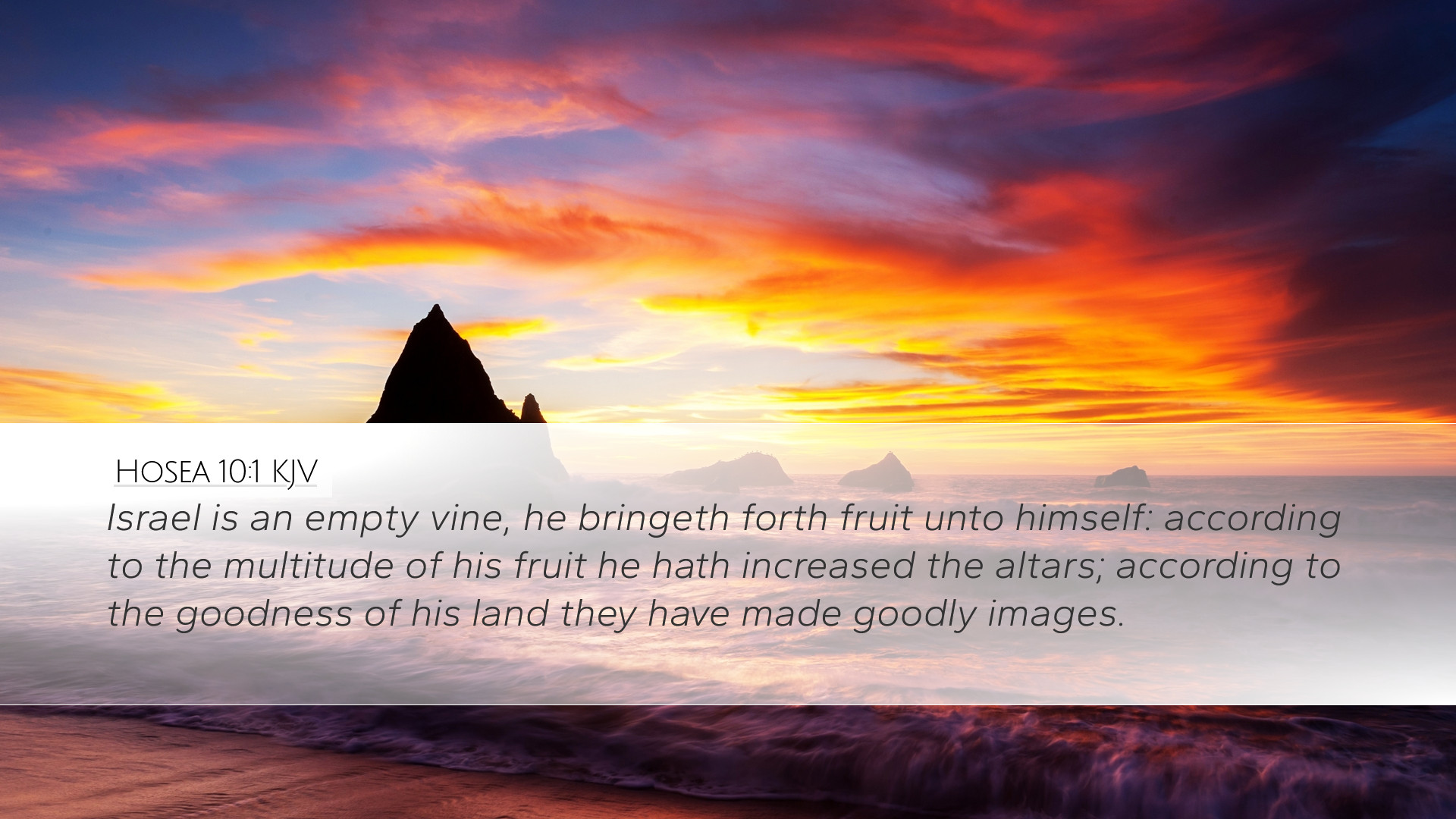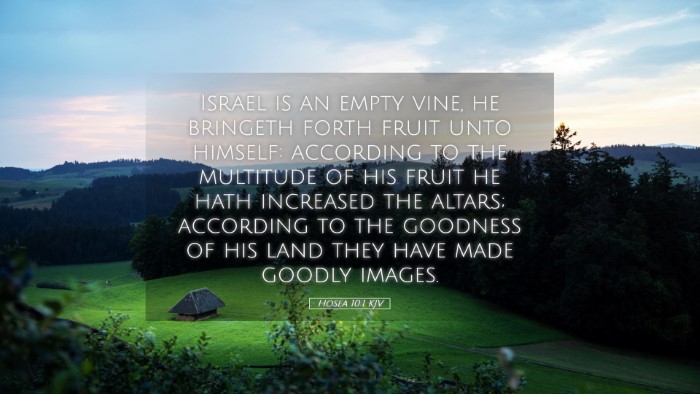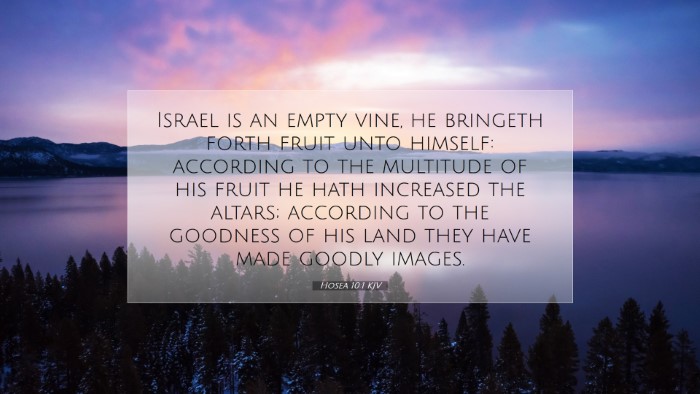Old Testament
Genesis Exodus Leviticus Numbers Deuteronomy Joshua Judges Ruth 1 Samuel 2 Samuel 1 Kings 2 Kings 1 Chronicles 2 Chronicles Ezra Nehemiah Esther Job Psalms Proverbs Ecclesiastes Song of Solomon Isaiah Jeremiah Lamentations Ezekiel Daniel Hosea Joel Amos Obadiah Jonah Micah Nahum Habakkuk Zephaniah Haggai Zechariah MalachiHosea 10:1
Hosea 10:1 KJV
Israel is an empty vine, he bringeth forth fruit unto himself: according to the multitude of his fruit he hath increased the altars; according to the goodness of his land they have made goodly images.
Hosea 10:1 Bible Commentary
Commentary on Hosea 10:1
Bible Verse: "Israel is a luxuriant vine that yields its fruit. The more his fruit increased, the more altars he built; as his country improved, he improved his pillars." (Hosea 10:1 ESV)
Introduction
The Book of Hosea presents a compelling narrative about God's relationship with Israel, depicting the profound themes of love, betrayal, judgment, and repentance. In Hosea 10:1, we encounter a vivid metaphor illustrating the affluent state of Israel contrasted with its spiritual decline. This commentary synthesizes insights from esteemed theologians such as Matthew Henry, Albert Barnes, and Adam Clarke, providing a rich examination of the text.
Contextual Background
Hosea prophesied during a time of great prosperity and subsequent moral decline in Israel. The nation had become endowed with blessings, represented by the metaphor of the vine. Yet, paradoxically, this increase in prosperity led to an increase in idolatry, as Israel turned away from true worship to fulfill carnal desires.
Verse Analysis
Luxuriant Vine
“Israel is a luxuriant vine that yields its fruit.”
Matthew Henry highlights that this imagery of a vine signifies both abundance and fruitfulness. Israel, like a vine, was intended to be fruitful in righteousness, showing forth the glory of God. The blessings bestowed upon them were ample, and as a nation, they enjoyed prosperity, which was a divine gift intended for their sustenance and growth.
Fruit and Altars
“The more his fruit increased, the more altars he built.”
Albert Barnes emphasizes the irony within this statement. The increase in Israel's prosperity led to a corresponding rise in idolatry. Instead of giving thanks to the Creator, the increase in fruitful production resulted in more altars erected to false gods. The altars serve as a symbol of their spiritual corruption, where genuine worship to God was replaced with pagan practices. This reflects a common human tendency to associate physical blessings with spiritual neglect.
Improvement of Pillars
“As his country improved, he improved his pillars.”
Adam Clarke elaborates on this phrase, noting that the ‘pillars’ signify established points of worship, often linked to paganism. These pillars represented the heights of spiritual blindness that Israel had reached. As the land prospered, instead of dedicating their increase to worshiping God, they invested in idols made by human hands. Clarke asserts that such a regression highlights a failure to recognize the true source of their blessings.
Theological Implications
- Divine Blessings and Human Responsibility: The text illustrates the relationship between divine blessings and human stewardship. Israel's failure to honor God with their increase serves as a cautionary tale for believers today.
- Idolatry from Prosperity: Hosea 10:1 warns against the inherent dangers of prosperity that lead to complacency and idolatry. As blessings accumulate, the temptation to stray from God becomes pronounced.
- The Call to Repentance: The overarching narrative of Hosea is one of hope and restoration. The account (including Hosea 10:1) is not merely a pronouncement of judgment but a call for Israel to return to a right relationship with God.
Applications for Contemporary Readers
Reflecting on Hosea 10:1, certain applications can be made that resonate across generations:
- Gratitude for Blessings: Readers are encouraged to maintain a heart of gratitude, acknowledging God as the source of all blessings in their lives.
- Guard Against Idolatry: Believers must vigilantly guard against the idolatry of modern society, which can take many forms—from materialism to misplaced priorities that draw attention away from God.
- Invitation to Restoration: The narrative ultimately invites readers to consider areas in their lives where they may need to repent and turn back to God, seeking His grace and guidance.
Conclusion
Hosea 10:1 serves as a powerful reminder of the delicate balance between divine blessing and human accountability. As Israel’s prosperity led them away from God, it compels contemporary Christians to examine their lives. Let this passage inspire a deeper commitment to honoring God with every aspect of life, acknowledging Him as the source of all good gifts.
Further Reflection
As we continue to study the profound messages within Hosea, let us seek the Spirit's guidance for understanding how these ancient truths apply to our modern lives, enabling us to bear fruit that glorifies God.


